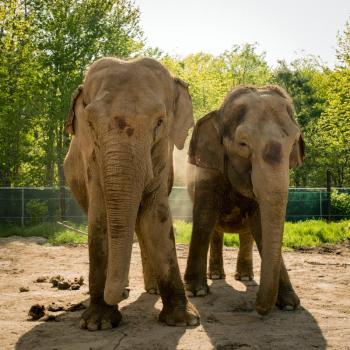Learn about elephants in Maine at the Village
Think of retired circus elephants Rosie and Opal as two very large animals on the tip of a vast crumbling iceberg.
In the headquarters of Hope Elephants they live in a 52 by 60-foot elephant barn with vaulted ceiling and a heated sand floor that is gentle on their legs. They receive daily therapeutic ultrasound treatments, hydrotherapy and low impact exercise, including elephant yoga.
In a broader sense, however, Andrew Stewart, Director of Hope Elephants, says the two roughly 40-year old Asian elephants are members of a species that faces real threats in the wild.
Stewart will speak at St. Andrews Village on August 13 at 1 p.m. about Rosie and Opal, their life in Hope, Maine, and the importance of conservation.
Stewart, who received an honors degree in animal biology from the University of St. Andrews in his native Scotland and also served as a safari guide in Botswana, said that while Hope Elephants takes its responsibility to care for its charges very seriously, its ultimate purpose is to educate people on how the rapid degradation of natural systems threatens animals and humans alike.
“The focus is to use (Rosie and Opal) as a springboard of our education piece,” Stewart said.
Elephants make an ideal teaching tool because people feel a special connection to them. Not only are they incredibly smart animals — on a level with primates and toothed whales — they are also very empathetic, said Stewart. Elephants have been known to bury their dead and adopt orphan elephants.
But while pachyderms are the focal point for Hope Elephants, Stewart pointed out that moose, one of Maine’s iconic animals, are declining in many parts of their range because higher temperatures are putting them under more stress during the summer month. Ticks, which have expanded northward with warmer winters can literally drain so much blood from a moose that they become anemic.
Hope Elephants fulfills its educational mission through speaking engagements, daily tours by appointment at its headquarters as well as virtual visits via Skype.
Beginning this year, the organization will also offer an 18-week multi-disciplinary curriculum, which includes activities on elephant physiology, ecology, animal behavior and conservation as well as multi-disciplinary activities.
Hope Elephants is also working to raise money for a program that funds the work of a veterinarian in India who specializes in (extremely) large animal. The vet responds to reports of elephant health emergencies for both wild and captive elephants. For more information, visit www.hopeelephants.org/dr-sarma-elephant-elephant-emergency-response-program.
The presentation on Hope Elephants is free and open to the public, but space is limited, so please RSVP by calling 207-633-0920.































